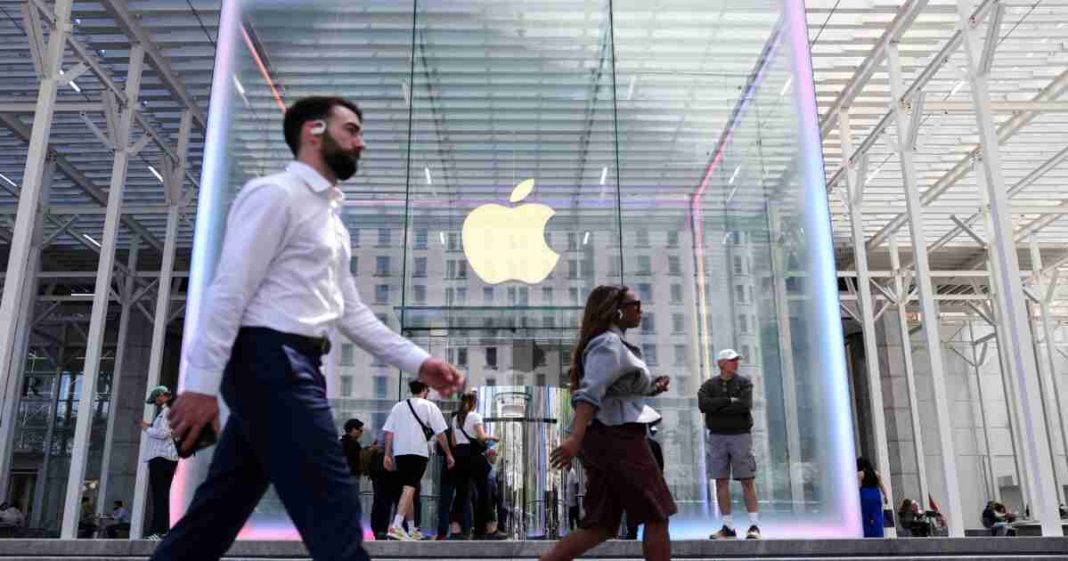Apple reported better-than-expected earnings for the second quarter, but a warning from CEO Tim Cook about rising costs due to global trade tariffs rattled investors. The tech giant posted revenue of $95.4 billion, up over 4% from last year, and an earnings-per-share of $1.65, beating Wall Street estimates of $94.5 billion in revenue and $1.62 EPS. Profit reached $24.8 billion, driven largely by strong iPhone sales, including $17 billion in revenue from China.
Read More: Israel Strikes Near Damascus Amid Druze Crisis in Syria
Despite the solid financials, Apple shares slipped over 4% in after-hours trading as the company projected a $900 million cost increase for the upcoming quarter due to shifting production out of China amid escalating US trade tensions.
Tariffs Fuel Supply Chain Overhaul
The cost surge is linked to Apple’s ongoing efforts to diversify its manufacturing base. CEO Tim Cook revealed during an earnings call that most iPhones sold in the US will soon be made in India, rather than China. This move is aimed at reducing Apple’s exposure to the tit-for-tat tariffs between Washington and Beijing, but it comes with short-term costs.
“Assuming the current global tariff rates, policies and applications do not change for the balance of the quarter and no new tariffs are added, we estimate the impact to add $900 million to our costs,” Cook said. However, he acknowledged the uncertainty of future tariff developments, saying it was “very difficult to predict beyond June.”
Electronics Temporarily Exempt — For Now
High-end tech goods like smartphones, computers, and semiconductors have so far received a temporary reprieve from US tariffs, following discussions between Cook and White House officials. After those talks, President Trump announced consumer electronics would be exempt, helping Apple’s stock rise 7% at the time. However, Commerce Secretary Howard Lutnick has called this exemption temporary, and even Trump later downplayed the permanence of the measure on social media.
Trump has made it clear he wants Apple to expand manufacturing in the US, and met with Cook in February to discuss the possibility. While Apple has not confirmed any US manufacturing plans, the president hinted that an announcement may be imminent, saying, “He’s going to start building. Very big numbers.”
India and Vietnam Rise in Apple’s Supply Chain
In response to rising tariffs and geopolitical tensions, Apple has been shifting more production to India and Vietnam. Cook confirmed that Vietnam will soon be the country of origin for nearly all US-bound iPad, Mac, Apple Watch, and AirPod products, while India will account for the majority of US iPhone sales. According to research firm Canalys, Apple ramped up production in India toward the end of the quarter and built up inventory ahead of anticipated tariffs.
“Apple is likely to further shift US-bound production to India to reduce exposure to future risks,” said Le Xuan Chiew, research manager at Canalys. However, analysts warn that this shift won’t be simple. Jacob Bourne of Emarketer noted that moving production involves complex timelines, capacity challenges, and cost increases that could squeeze margins or be passed on to consumers.
China Still Dominates Global Production
Despite the pivot, China remains central to Apple’s global operations. Cook stressed that most Apple products for markets outside the US will still be made in China. However, as trade tensions intensify and tariff uncertainties persist, the company’s long-term strategy appears increasingly focused on diversifying production locations to safeguard supply chains.
Read More: India Blocks Arshad Nadeem’s Instagram
Apple’s stock has slumped 16% since the start of the year, and investors are keeping a close eye on how the company navigates growing trade challenges. While Cook remains upbeat and emphasized “strong quarterly results” and active engagement in tariff discussions, analysts believe the next few quarters will test Apple’s ability to balance global politics with its sprawling manufacturing needs.














